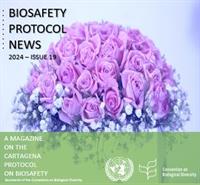 |
|
Latest Issue: No. 19 - 2024
National and Regional Celebrations:
20th anniversary of the entry into force of the Cartagena Protocol on Biosafety
|
-Mr. António Guterres, United Nations Secretary-General
|
|
On the 20th anniversary of the Cartagena Protocol on Biosafety, we celebrate this agreement which has done so much to protect people and nature from harm. We applaud its near universal ratification. The planetary crisis we face today underlines the importance of this agreement. Humanity’s destruction of the natural world is pushing one million of Earth’s eight million species towards extinction. We must make peace with nature. And biosafety is a vital part of those efforts. As we celebrate the anniversary of the Cartagena Protocol, we reaffirm our commitment to preserving biosafety, protecting biodiversity, and working together to build a safe and sustainable future for all.
|
-Mr. David Cooper, Acting Executive Secretary of the Secretariat of the Convention on Biological Diversity, United Nations Environment Programme
 |
|
Twenty years ago, the Cartagena Protocol on Biosafety entered into force. This was a milestone achievement under the Convention on Biological Diversity. As you can see we have reason to celebrate. The adoption of the Kunming-Montreal Global Biodiversity Framework by the Conference of Parties to the Convention at its fifteenth meeting in Montreal in 2022 gives a further boost to the Protocol. The framework includes a target -- Target 17 – with the specific aims to establish, strengthen capacity for, and implement in all countries, biosafety measures and measures for the handling of biotechnology and distribution of its benefits. The Implementation Plan to the Cartagena Protocol on Biosafety and the Capacity-Building Action Plan, also adopted in Montreal, will help guide and support Parties in their implementation of the Protocol to 2030. We must continue to enhance collaboration to ensure the safe use of biotechnology for sustainable development. Let us renew our commitments and continue moving towards our goals and targets.
|
Ms. Nasrin Sadat Esmailzadeh, BCH National Focal Point, the Islamic Republic of Iran
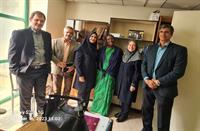 |
|
Based on various seminars, workshops, expert meetings and generally twenty years of experience and lessons learned in the implementation of the Cartagena Protocol on Biosafety by I.R. IRAN, specialized committee of National Biosafety Council is updating the National Biosafety Law (approved in 2009) for better implementation of the Protocol.
|
Ms. Milena Roudna, former Focal Point of the Cartagena Protocol on Biosafety, the Czech Republic
 |
|
In the Czech Republic, the 20 years of the entry into force of the Cartagena Protocol was remembered at several occasions:
• World Engineers Convention, Prague, October 2023, during presentation on theme “Women in Science and Engineering
• Meeting of the Czech Commission on the Use of Genetically Modified Organisms and Genetic Products, Ministry of the Environment
• Workshop of the Czech Forestry Society
• Special article in the Newsletter of the Czech Association of Scientific and Technical Societies - Newsletter No. 54, p. 58-59
The meetings, in total, brought together 50 participants and more readers of the Newsletter.
|
Ms. Maral Sagynaliera, National Policy Specialist, Ms. Cholpon Alibakieva, Project manager, Mr. Abdymital Chyngojoev, National Specialist on LMO Risk Assessment, Risk Management and Monitoring and Mr. Namazbek Abdykerimov, National Specialist on LMO Detection and Identification, FAO project for Kyrgyzstan
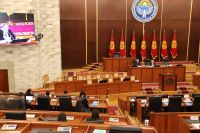 |
|
In 2023, there were several events to mark the 20th anniversary. In 2023, under the Food and Agriculture Organization/Global Environment Facility (FAO)/(GEF) project on the Cartagena Protocol on Biosafety in the Kyrgyz Republic, four workshops on LMO/GMO issues were held for project stakeholders. The Inter-ministerial Working Group and the Project Steering Committee were set up and approved by the Ministry of Natural Resources, Ecology and Technical Supervision of the Kyrgyz Republic with the role as the GEF Operational Focal Point and the Cartagena Protocol Focal Point. The Consultative Working Meeting was held from 13 to 15 September 2023 to share opportunities and needs on biosafety-related issues among stakeholders. FAO also provided technical and advisory support to the Jogorku Kenesh (Parliament of the Kyrgyz Republic) to draft biosafety law in the country.
В 2023 году было проведено несколько мероприятий, посвященных 20-летию вступления в силу Картахенского протокола по биобезопасности. В том же году в рамках проекта Продовольственной и сельскохозяйственной организации / Глобального экологического фонда (ФАО)/(ГЭФ) по реализации Картахенского протокола по биобезопасности в Кыргызской Республике было проведено четыре семинара по вопросам ЖИО/ГМО для заинтересованных сторон проекта. Межведомственная рабочая группа и Наблюдательный комитет проекта были созданы и утверждены Министерством природных ресурсов, экологии и технического надзора Кыргызской Республики, выполняющим функции операционного координатора ГЭФ и координатора Картахенского протокола. Также была проведена Консультативная рабочяя встреча с 13 по 15 сентября 2023 года с целью обмена возможностями и потребностями по вопросам биобезопасности между всеми заинтересованными сторонами. ФАО в рамках проекта также оказала техническую и консультативную помощь Жогорку Кенешу (Парламенту Кыргызской Республики) в разработке проекта закона о биологической безопасности в стране.
|
Mr. Mathurin Wend-rabu Rouamba, BCH Focal Point, Burkina Faso
 |
|
In accordance with the Cartagena Protocol on Biosafety and the National Biotechnology Safety Regime Act, the National Biosafety Agency, a national authority, has a duty to inform and raise public awareness of modern biotechnology and biosafety. For the celebration of the 20th anniversary, several information and awareness-raising sessions were organized during 2023. These sessions improved the knowledge of 1266 students and trainees from 4 universities/institutions and 5 vocational training schools on modern biotechnology and biosafety issues.
En accordance avec le protocole de Carthagène sur la biosécurité et à la loi nationale sur le régime de sécurité de la biotechnologie, l'Agence nationale de biosécurité, autorité nationale, a le devoir d'informer et de sensibiliser le public à la biotechnologie moderne et à la biosécurité. Dans le cadre de la célébration du 20ème anniversaire du protocole de Cartagena, plusieurs sessions d'information et de sensibilisation ont été organisé au cours de l’année 2023. Ces sessions ont amélioré les connaissances de 1266 étudiants et stagiaires de 04 universités/instituts et 05 écoles de formation professionnelle sur les questions de biotechnologie moderne et de biosécurité.
|
Ms. Melisa Ojeda Casbrara, BCH Focal Point, Guatemala
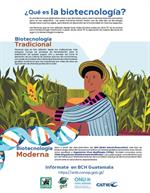 |
|
To celebrate the 20th anniversary of the Protocol, Guatemala has issued several publications. We would also like to present to you a story on maize.
Mesoamerica, a region of which Guatemala is a part, is the center of origin and diversity of maize. In this unique region in the world, there is the greatest diversity of cultivated maize and the presence of their ancestors known locally as Teocintles. Did you know? • In Guatemala there are two species of Teosintle that are distributed in the Huehutenango region and in the east of the country. • Both species populations are strongly threatened by land use change, burning of surrounding vegetation and use of agrochemical products.
Wild maize is also called the mother, father, or ancestor of the cultivated maize that we consume today around the world. It was the one that gave rise to cultivated maize, after a long domestication process developed by the ancient Mayans. Scientifically, maize is called Zea mays; There are 6 wild relatives that are distributed between Guatemala and Mexico, 2 and 4 species respectively. For Guatemalans, the maize and especially the native breeds, represents more than food for the body, it is also a spiritual food, and its different varieties are used in different food preparations related to traditional and ancestral knowledge of Mayan origin, and many varieties are also part of Mayan ceremonies. Protect, conserve and incentive the traditional use and consumption of the native varieties of maize, the Teocintles and the traditional knowledge, are a part of our most valuable treasures that we offer to humanity.
The Teocintle Zea mays subsp. huehuetenangensis, is endemic to the department of Huehuetenango, specifically to the municipalities of Santa Ana Huista, San Antonio Huista and Jacaltenango. Locally it is known as Salic or Milpa de Rayo. It is in an area ranging from 743 to 1750 meters above sea level, on the edges of farmland, roadsides or as weeds within corn cultivation. In the oriental region of Guatemala, exist the Teocintle Zea luxurians, which is present in the departments of Jutiapa, Jalapa, and Chiquimula, in the east of the country. It grows in abandoned areas, along roadsides, as weeds within maize cultivated, rice or sorghum crops, or within areas with secondary vegetation. It is distributed in areas ranging from 600 to 1150 meters above sea level.
Tesoros Nacionales de Guatemala, parientes silvestres del maíz Mesoamérica, región de la que forma parte Guatemala, es el centro de origen y diversidad del maíz. En esta región única en el mundo existe la mayor diversidad de maíces cultivados y la presencia de sus ancestros conocidos localmente como Teocintles. ¿Sabías qué? • En Guatemala existen dos especies de Teosintle que se distribuyen en la región de Huehutenango y el oriente del país. • Ambas poblaciones de especies se encuentran fuertemente amenazadas por el cambio de uso del suelo, la quema de vegetación circundante y el uso de productos agroquímicos.
El Teocintle Zea mays subsp. huehuetenangensis, es endémica del departamento de Huehuetenango, específicamente de los municipios de Santa Ana Huista, San Antonio Huista y Jacaltenango. Localmente se le conoce como Salic o Milpa de Rayo. Se encuentra en una zona que va desde los 743 a los 1750 metros sobre el nivel del mar, en los bordes de tierras de cultivo, bordes de caminos o como maleza dentro del cultivo de maíz. En la región oriental de Guatemala existe el lujoso Teocintle Zea, que está presente en los departamentos de Jutiapa, Jalapa y Chiquimula, en el oriente del país. Crece en áreas abandonadas, a lo largo de caminos, como maleza dentro de cultivos de maíz, arroz o sorgo, o dentro de áreas con vegetación secundaria. Se distribuye en zonas que van desde los 600 a los 1150 metros sobre el nivel del mar. Al maíz silvestre también se le llama madre, padre o ancestro del maíz cultivado que hoy consumimos en todo el mundo. Fue el que dio origen al maíz cultivado, tras un largo proceso de domesticación desarrollado por los antiguos mayas. Existen 6 parientes silvestres que se distribuyen entre Guatemala y México, 2 y 4 especies respectivamente. Para los guatemaltecos, el maíz y en especial las razas nativas, representan más que un alimento para el cuerpo, también es un alimento espiritual, y sus diferentes variedades se utilizan en diferentes preparaciones alimenticias relacionadas con los conocimientos tradicionales y ancestrales de origen maya, y muchas variedades forman parte de las ceremonias mayas. Proteger y conservar los recursos genéticos, e incentivar el uso y consumo tradicional de las variedades nativas de maíz, los Teocintles y los conocimientos tradicionales relacionados, son parte de nuestros tesoros más valiosos que ofrecemos a la humanidad.
|
Mr. Kamal Kumar Rai, the Society for wetland biodiversity conservation Nepal Nepal indigenous forum for biodiversity, Kirant Indigenous from Nepal
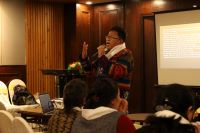 |
|
Indigenous peoples and local communities have been celebrating 20 years of biosafety through a few initiatives. As Non-state actors, trained and a members of several Ad-hoc technical expert groups (ATHEGs) from IPLCs, IPLCs have a strategy to promote the Capacity-building Action Plan for 2030 and the Convention on Biological Diversity’s Communication, Education and Public Awareness (CEPA) program, through networks, lobbying and advocating for the implementation of the Cartagena Protocol on Biosafety. In particular, IPLCs promote: a) Article 26 on socio-economic considerations; b) cultural and ethical consideration; c) the Biosafety Clearing-House; d) Article 31 and Article 24 of the Convention, recognizing the relationship and reciprocity of IPLCs with Mother Nature, biodiversity conservation and customary sustainable use; e) Target 17 of Kunming-Montreal Global Biodiversity Framework in National Biodiversity Strategies and Action Plans (NBSAPs); and; f) full and effective participation, free, prior and informed consent of IPLCs. IPLCs promote taking leadership and inspire other to safeguard, restore and promote right based approach.
|
Mr. Pedro Rocha, International specialist and coordinator in biotechnology and biosafety, the Inter-American Institute for Cooperation on Agriculture (IICA)
 |
|
IICA and preparation for next COP16-MOP11
To continue the celebration of the 20th anniversary of the Protocol this year and as part of its technical cooperation activities, IICA has been holding virtual sessions aimed at providing monthly updates and supporting the ongoing exchange of technical information on issues relevant to the biosafety performance of the countries of the American hemisphere, within the framework of the CBD and its derived Protocols. The comments presented at this meeting do not represent the official position of any country and are simply a technical input that may be useful for the internal discussions of the countries and thus contribute to the preparation of the next COP16-MOP11 (Colombia, 2024).
El IICA y la preparación de la próxima COP16-MOP11
Para continuar con la celebración del 20 aniversario del Protocolo este año y como parte de sus actividades de cooperación técnica, el IICA ha venido realizando sesiones virtuales con el objetivo de actualizar mensualmente y apoyar el intercambio permanente de información técnica sobre temas relevantes para el desempeño en bioseguridad de los países del hemisferio americano, en el marco del CDB y sus Protocolos derivados. Los comentarios presentados en esta reunión no representan la posición oficial de ningún país y son simplemente un aporte técnico que puede ser útil para las discusiones internas de los países y así contribuir a la preparación de la próxima COP16-MOP11 (Colombia, 2024).
|
Useful Information
Quotes on past successes
Mr. Roy B. Mugiira, National Focal Point from the Cartagena Protocol on Biosafety, Kenya
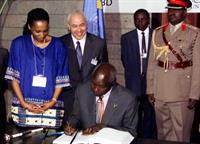
“Upon opening for signature in Nairobi in June 2000, Kenya became the first country to sign the Protocol and to ratify it in 2003 upon coming into force, confirming Kenya’s commitment to the global governance of Modern Biotechnology and Biodiversity Conservation, and positioning the country in the global biotechnology enterprise”.
Photo: Kenya’s retired (late) President Daniel T. arp Moi signs the Cartagena Protocol on Biosafety in June 2000, flanked by Mr. Hamdallah Zedan, the Executive Secretary of the Convention on Biological Diversity (CBD) and Ms. Cyrie Sendashonga, the head of the Biosafety Programme at the CBD Secretariat.

Ms. Jimena Nieto Carrasco, Former Co-Chair of the Open-ended Ad Hoc Working Group of Legal and Technical Experts on Liability and Redress in the context of the Cartagena Protocol on Biosafety
In my capacity as former Co-Chair for the Nagoya – Kuala Lumpur Supplementary Protocol on Liability and Redress to the Cartagena Protocol on Biosafety, I would like to emphasize two important aspects: the first one is the welcomed fact that the Treaty entered into force in 2018, the second, and this may sound paradoxical, is that until now there has been no need to implement its provisions, an indication of the effectiveness of the biosafety framework.
Photo: René Lefeber, Netherlands, and Jimena Nieto, Colombia, former Co-Chair of the Open-ended Ad Hoc Working Group of Legal and Technical Experts on Liability and Redress in the context of the Cartagena Protocol on Biosafety
UN Secretary-General António Guterres has appointed Ms. Astrid Schomaker as the Executive Secretary of the Convention on Biological Diversity
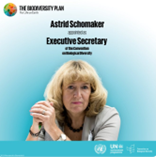 More information
Implementation Plan and Capacity-building Action Plan booklet
More information
Implementation Plan and Capacity-building Action Plan booklet
 Implementation Plan and Capacity-building Action Plan booklet
COP-MOP 10 booklet
Implementation Plan and Capacity-building Action Plan booklet
COP-MOP 10 booklet
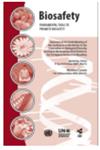 COP-MOP 10 booklet
2024 United Nations Biodiversity Conference in Colombia
Host Government
Logo
Presentation Template of the Protocol
Updated presentation of the Protocol (can be used by any stakeholder)
Biodiversity Plan Logo
COP-MOP 10 booklet
2024 United Nations Biodiversity Conference in Colombia
Host Government
Logo
Presentation Template of the Protocol
Updated presentation of the Protocol (can be used by any stakeholder)
Biodiversity Plan Logo
 More information on the GBF and the logo
Video recording of CBD/Aarhus Convention round table related to Article 23
Video recording
Items: 20th anniversary of the entry into force of the Protocol, 2023
More information on the GBF and the logo
Video recording of CBD/Aarhus Convention round table related to Article 23
Video recording
Items: 20th anniversary of the entry into force of the Protocol, 2023
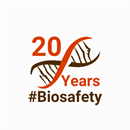
Statements and articles, presentations, photos from previous COP-MOPs and an anniversary video.
Recent anniversary events are below
Anniversary website
Video of the anniversary
Photos from previous COP-MOPs and other negotiations
Items: 24th anniversary of the adoption of the Protocol, 29 January 2024
Flyer of a quote from the Acting Executive Secretary
Notifications
Hotel Booking System for the UN Biodiversity Conference 2024 in Cali, Colombia
Expressions of Interest for the UN Biodiversity Conference 2024 Exhibition, Pavilion and Country Office Spaces
Registration for the Sixteenth meeting of the Conference of the Parties to the Convention on Biological Diversity (COP 16) and the concurrent meetings of the Parties to the Cartagena and Nagoya Protocols, and for the Fifth meeting of the Subsidiary Body on Implementation
Appointment of the next Executive Secretary of the Secretariat of the Convention on Biological Diversity
Selected representatives of indigenous peoples and local communities to receive funding for their participation in the Twenty-sixth meeting of the Subsidiary Body on Scientific, Technical and Technological Advice and the Fourth meeting of the Subsidiary Body on Implementation
First programming tranche of the Global Biodiversity Framework Fund
Theme of the International Day for Biological Diversity (22 May 2024)
Registration for the twenty-sixth meeting of the Subsidiary Body on Scientific, Technical and Technological Advice (SBSTTA 26), 13–18 May 2024 and the fourth meeting of the Subsidiary Body on Implementation (SBI 4), 21 to 29 May 2024, Nairobi, Kenya
Update on the Sixteenth meeting of the Conference of the Parties to the Convention on Biological Diversity, the Eleventh meeting of the Conference of the Parties serving as the meeting of the Parties to the Cartagena Protocol on Biosafety, and the Fifth meeting of the Conference of the Parties serving as the meeting of the Parties to the Nagoya Protocol on Access to Genetic Resources and the Fair and Equitable Sharing of Benefits Arising from their Utilization
Statistics
Results of a joint CBD/Aarhus Convention survey on guiding materials
• 12 questions
• From 23 Oct. to 4 Dec. 2023
• 35 responses received, more focal points from the Protocol than the Aarhus Convention (GMO Amendment)
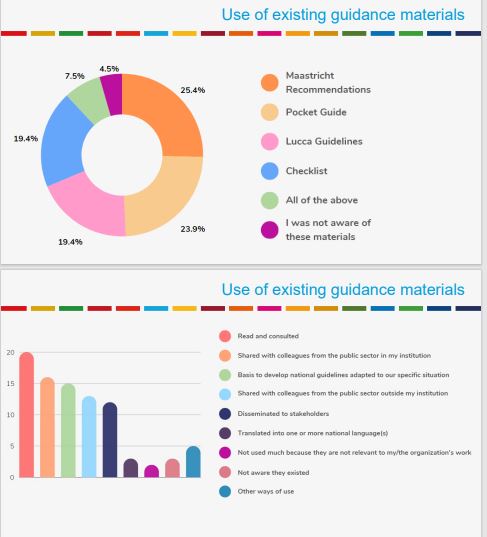
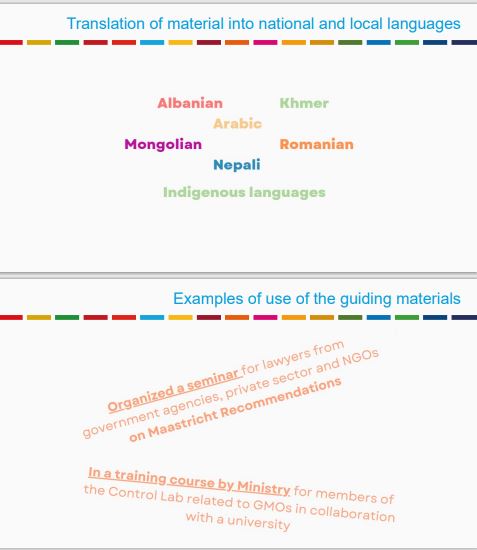 2 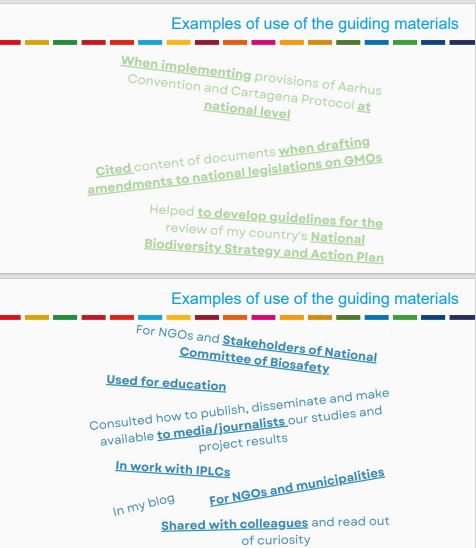 Results of a poll on public awareness, education and participation, including access to information, regarding LMOs
Results of a poll on public awareness, education and participation, including access to information, regarding LMOs
10 questions
From 16 Aug. to 16 Oct. 2023
23 respondents
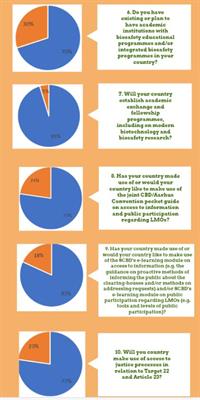 More information
More information
Recent and forthcoming biosafety-related events
Recent events
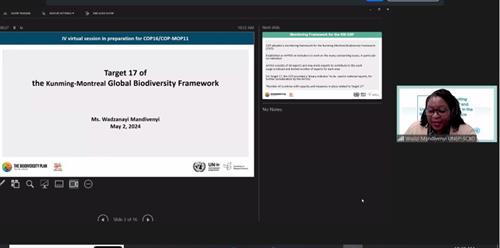 IICA Pre-COP16-MOP11 for Latin American and the Caribbean region (SCBD Presentation on Target 17)
IICA Pre-COP16-MOP11 for Latin American and the Caribbean region (SCBD Presentation on Target 17)
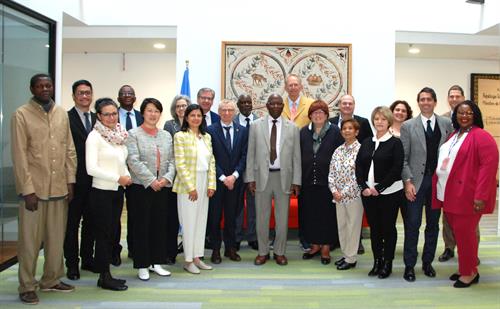 Nineteenth meeting of the Compliance Committee under the Cartagena Protocol on Biosafety, in Montreal, Canada, from 30 April to 2 May 2024
Nineteenth meeting of the Compliance Committee under the Cartagena Protocol on Biosafety, in Montreal, Canada, from 30 April to 2 May 2024
 Webinar Recording: Finding Help materials in the BCH (e.g. videos, chat, knowledge base, training site), 11 April 2024
Webinar Recording: Finding Help materials in the BCH (e.g. videos, chat, knowledge base, training site), 11 April 2024
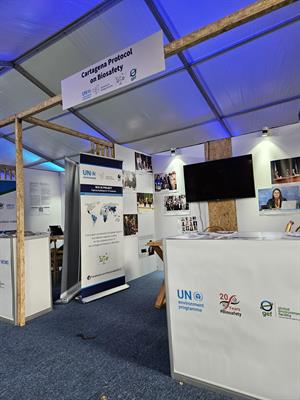  Joint CBD/UNEP Side Event and Exhibit at UNEA-6 on "20 years journey with Cartagena Protocol on Biosafety Supporting sustainable utilization of biodiversity", in Nairobi, Kenya, side event on the 29 February 2024 and exhibit from the 26 February to 1 March 2024 Video recording
Joint CBD/UNEP Side Event and Exhibit at UNEA-6 on "20 years journey with Cartagena Protocol on Biosafety Supporting sustainable utilization of biodiversity", in Nairobi, Kenya, side event on the 29 February 2024 and exhibit from the 26 February to 1 March 2024 Video recording
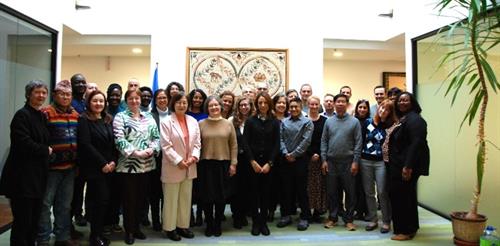 Second meeting of the Ad Hoc Technical Expert Group on Risk Assessment, in Montreal, Canada, from 27 February to 1 March 2024
Second meeting of the Ad Hoc Technical Expert Group on Risk Assessment, in Montreal, Canada, from 27 February to 1 March 2024
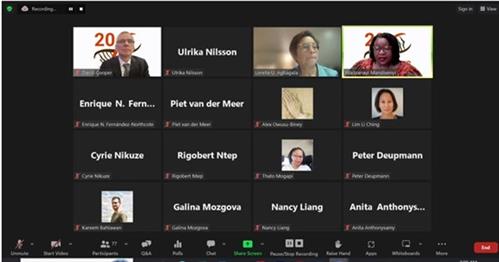
Webinar of the Liaison Group on the Cartagena Protocol on Biosafety, opening event for the online discussions of the Liaison Group, 7 February 2024

Online discussions of the Liaison Group on the Cartagena Protocol are organized from 7 to 21 February 2024 to provide a contribution to the development of the monitoring framework as it relates to Target 17.
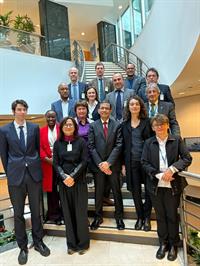
Eighteenth coordination meeting of the Green Customs Initiative, hosted by the World Customs Organization, in Brussels, Belgium, 7 to 8 February 2024
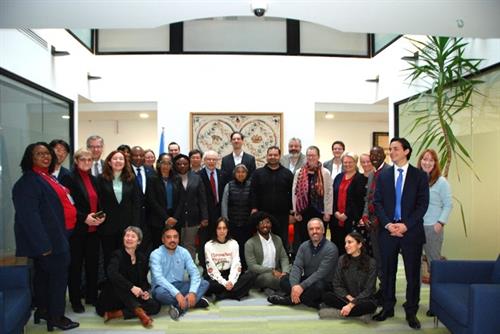 Second meeting of the multidisciplinary Ad Hoc Technical Expert Group on Synthetic Biology to Support the Process for Broad and Regular Horizon Scanning, Monitoring and Assessment, in Montreal, Canada, from 29 January to 2 February 2024
Second meeting of the multidisciplinary Ad Hoc Technical Expert Group on Synthetic Biology to Support the Process for Broad and Regular Horizon Scanning, Monitoring and Assessment, in Montreal, Canada, from 29 January to 2 February 2024
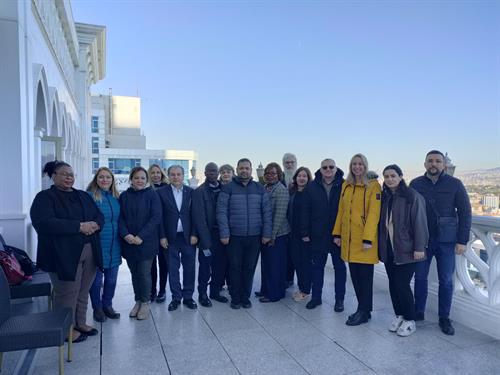
Central and Eastern Europe Regional Biosafety Clearing-House (BCH) training workshop on the UNEP-GEF BCH III Project, with the support from the Regional Advisor for the CEE Region and the SCBD, in Ankara, Turkey, from 22 to 26 of January 2024.
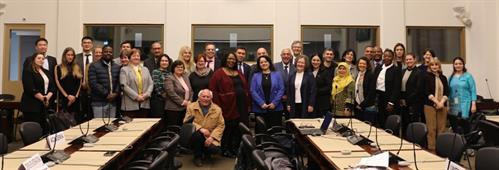 Fourth joint Aarhus Convention and Convention on Biological Diversity round table on public awareness, education, access to information, public participation and access to justice regarding living modified organisms/genetically modified organisms in Geneva, Switzerland from 11 to 12 December 2023
Fourth joint Aarhus Convention and Convention on Biological Diversity round table on public awareness, education, access to information, public participation and access to justice regarding living modified organisms/genetically modified organisms in Geneva, Switzerland from 11 to 12 December 2023
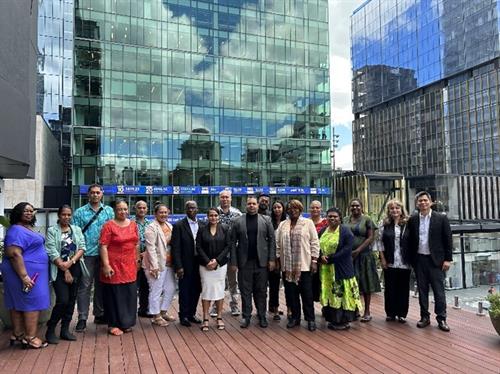
The Pacific Regional BCH training workshop on the UNEP-GEF BCH III Project, with the support from the Regional Advisor for the CEE Region and the SCBD, in Auckland, New Zealand, from 20 to 24 November 2023.
 Online forum of the Network of Laboratories for the Detection and Identification of Living Modified Organisms, from 17 to 28 November 2023
Online forum of the Network of Laboratories for the Detection and Identification of Living Modified Organisms, from 17 to 28 November 2023
 Open-ended Online Forum on Synthetic Biology, from 6 to 22 November 2023
Open-ended Online Forum on Synthetic Biology, from 6 to 22 November 2023
 First meeting of the Ad Hoc Technical Expert Group on Risk Assessment, in Montreal, Canada, from 1 to 3 November 2023
First meeting of the Ad Hoc Technical Expert Group on Risk Assessment, in Montreal, Canada, from 1 to 3 November 2023
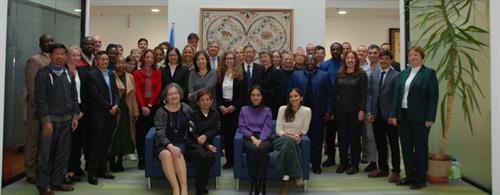 Global risk assessment workshop, in Montreal, Canada, from 30 to 31 October 2023
Global risk assessment workshop, in Montreal, Canada, from 30 to 31 October 2023
 Eighteenth meeting of the Compliance Committee under the Cartagena Protocol on Biosafety, in Montreal, Canada, from 24 to 26 October 2023
Eighteenth meeting of the Compliance Committee under the Cartagena Protocol on Biosafety, in Montreal, Canada, from 24 to 26 October 2023
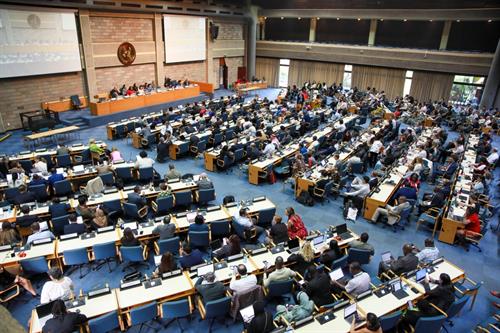 Resumed second part of the tenth meeting of the Conference of the Parties serving as the meeting of the Parties to the Cartagena Protocol on Biosafety
Resumed second part of the tenth meeting of the Conference of the Parties serving as the meeting of the Parties to the Cartagena Protocol on Biosafety
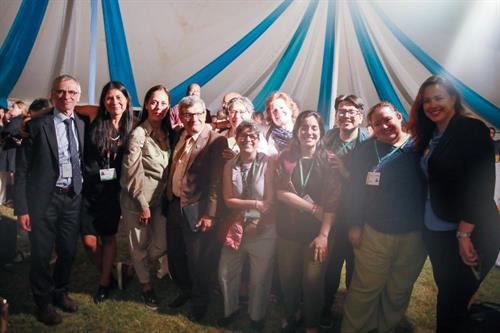
Reception to mark the 20th Anniversary of the entry into force of the Cartagena Protocol on Biosafety, 19 October 2023, Nairobi, Kenya
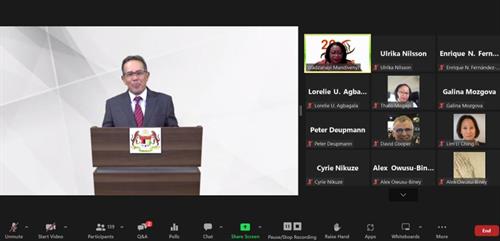 Webinar on the celebration of the twentieth anniversary of the entry into force of the Cartagena Protocol on Biosafety, 11 September 2023
Webinar on the celebration of the twentieth anniversary of the entry into force of the Cartagena Protocol on Biosafety, 11 September 2023
 Open-ended Online Forum on Risk Assessment, from 21 to 25 August 2023
Forthcoming events
Information workshop on the work of the ad hoc technical expert groups on indicators, synthetic biology and risk assessment, 11 May 2024, Nairobi, Kenya
Twenty-sixth meeting of the Subsidiary Body on Scientific, Technical and Technological Advice, 13–18 May 2024, Nairobi, Kenya (Items on Risk Assessment and Risk Management of LMOs, Detection and Identification of LMOs and Synthetic Biology)
Fourth meeting of the Subsidiary Body on Implementation, 21–29 May 2024, Nairobi, Kenya
International Day for Biodiversity, 22 May 2024
Open-ended Online Forum on Risk Assessment, from 21 to 25 August 2023
Forthcoming events
Information workshop on the work of the ad hoc technical expert groups on indicators, synthetic biology and risk assessment, 11 May 2024, Nairobi, Kenya
Twenty-sixth meeting of the Subsidiary Body on Scientific, Technical and Technological Advice, 13–18 May 2024, Nairobi, Kenya (Items on Risk Assessment and Risk Management of LMOs, Detection and Identification of LMOs and Synthetic Biology)
Fourth meeting of the Subsidiary Body on Implementation, 21–29 May 2024, Nairobi, Kenya
International Day for Biodiversity, 22 May 2024
Online discussion on a communication plan for the Cartagena Protocol on Biosafety (August 2024, TBA)
Eleventh meeting of the Conference of the Parties serving as the meeting of the Parties to the Cartagena Protocol on Biosafety (COP-MOP-11), 21 October–1 November 2024, in Cali, Colombia
BCH training workshop, Cali, Colombia (TBA)
GBF Pavilion, Biosafety (half-a-day), Cali, Colombia, (TBA)
African BCH Training Workshop, 2024 (TBA)
Editors: Ms. Nicole Appleton Ms. Wadzanayi Mandivenyi Ms. Ulrika Nilsson
Photo credit: Ms. Melisa Ojeda Cabrera Ms. Nasrin Sadat Esmailzadeh Ms. Ulrika Nilsson Mr. Kamal Kumar Rai Mr. Mathurin Wend-rabu Rouamba Ms. Milena Roudna Mr. Pedro Rocha Ms. Maral Sagynaliera UNEP
Archive: Previous newsletter issues
Subscription: Newsletter subscription
Twitter
Facebook
Disclaimer: The designations employed and the presentation of the material in this publication do not imply the expression of any opinion whatsoever on the part of the Secretariat of the Convention on Biological Diversity concerning the legal status of any country, territory, city or area or of its authorities, or concerning the delimitation of its frontiers or boundaries. The views expressed in this publication are those of the authors and do not necessarily reflect those of the two secretariats, nor does citing of trade names or commercial processes constitute endorsement.
|